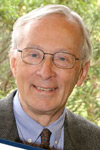 |
|||||||||||
|
|||||||||||
|
|||||||||||
|
The primary purpose of the newly appointed Global R&D Board is to oversee and define a balanced R&D program for the three regions involved with the International Linear Collider. Slightly different from the other two boards GDE Director Barry Barish established, the R&D board will have to coordinate the many existing projects and evaluate new proposals, which are funded in three different regions. "There has not been an attempt to explicitly coordinate these programs.", said Columbia University's Bill Willis, who is chair of the board. "At this moment there is a lot of R&D already going on in many different places. This means that we cannot follow our mandate in a simple way, which would be to ask for proposals. We start without being able to ask for fresh proposals, so it is like getting to the theatre well after the movie started." The first task for the 10-person board is to evaluate all of the current programs in place. The R&D Board broke the work down into 10 subcategories and assigned each one to an expert member in the group. By mid-January, the board members will share ideas with each other. "We have to get moving pretty quickly because new proposals will be submitted over the next 2-3 months.", Willis said. "If we want to have any impact on those proposals, we need to start to define things soon." As the board studies the work that is currently taking place, they are simultaneously imagining what the ideal R&D program should be to support the Baseline Configuration Document for the ILC. "The ideal program would be proposal driven.", Willis said. "We would get proposals and evaluate how they fit into the overall program. This way we would find the places of duplication and make them more efficient, finding the gaps." In an effort to bring the accelerator and detector R&D work closer together, the R&D Board will also evaluate the balance between the two programs and recommend priorities. Chris Damerell, a member of the board, is currently in the process of conducting a worldwide study of the detector work. "We have to make sure that there is a balance between the two programs in the proposals that we have, and this will be different in different regions.", Willis said. "It may not converge right away, but it is being done." --Elizabeth Clements |
|||||||||||
| © International Linear Collider |
